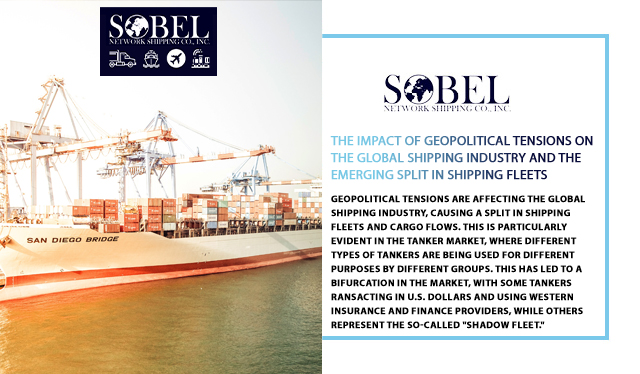Geopolitical tensions are affecting the global shipping industry, causing a split in shipping fleets and cargo flows. This is particularly evident in the tanker market, where different types of tankers are being used for different purposes by different groups. This has led to a bifurcation in the market, with some tankers transacting in U.S. dollars and using Western insurance and finance providers, while others represent the so-called “shadow fleet.” These vessels have opaque ownership and do not transact in dollars or use Western services. The shadow fleet first emerged after sanctions against Iran and grew after sanctions targeted Venezuela and after Russia invaded Ukraine. Older crude and product tankers are being purchased by buyers in the Middle East, China, and India for use in the growing shadow fleet.
Container shipping is also being affected by geopolitical unrest, which has the potential for negative consequences in the future. The splitting of the fleet seen in tanker shipping is also apparent in container shipping, albeit to a lesser degree. Almost all container shipping lines ceased serving Russian ports shortly after the invasion of Ukraine, with the notable exception of MSC. Other ship operators are now filling in the gaps left by the departed ocean carriers. Geopolitics is heightening the focus on “friend-shoring,” container trade between trusted countries that share common values. If friend-shoring becomes the standard trading model, ocean carriers will need to start thinking creatively about how they can continue to serve both sides of the divide.
Dry bulk shipping is also experiencing a split in the market, with trade becoming less efficient but rates being positively impacted in the near term. The near-term effect on dry bulk is similar to tanker shipping, with trade becoming less efficient as some countries choose to import from different sources. The EU banned imports of Russian coal after Russia invaded Ukraine, and it’s now buying coal from sources farther afield, such as Colombia, South Africa, the U.S., and Australia. Russian coal exports have shifted to longer-haul voyages to India and China.
Geopolitical unrest poses high risk to future shipping demand. The higher the global GDP growth, the better for shipping demand over the long term. However, a shift to geopolitical rivalry as opposed to multilateral cooperation would translate into a significant GDP hit for developed and developing countries, as well as a GDP blow to the least developed countries. An escalation of the Ukraine-Russia war or a military conflict involving the U.S. and China over Taiwan is predicted to have a highly negative effect on the global economy and the shipping industry.
In summary, the consequences of geopolitical tensions could have a highly negative effect on the global economy and the shipping industry. The situation is evolving, and further developments could have a significant impact on the shipping industry.


